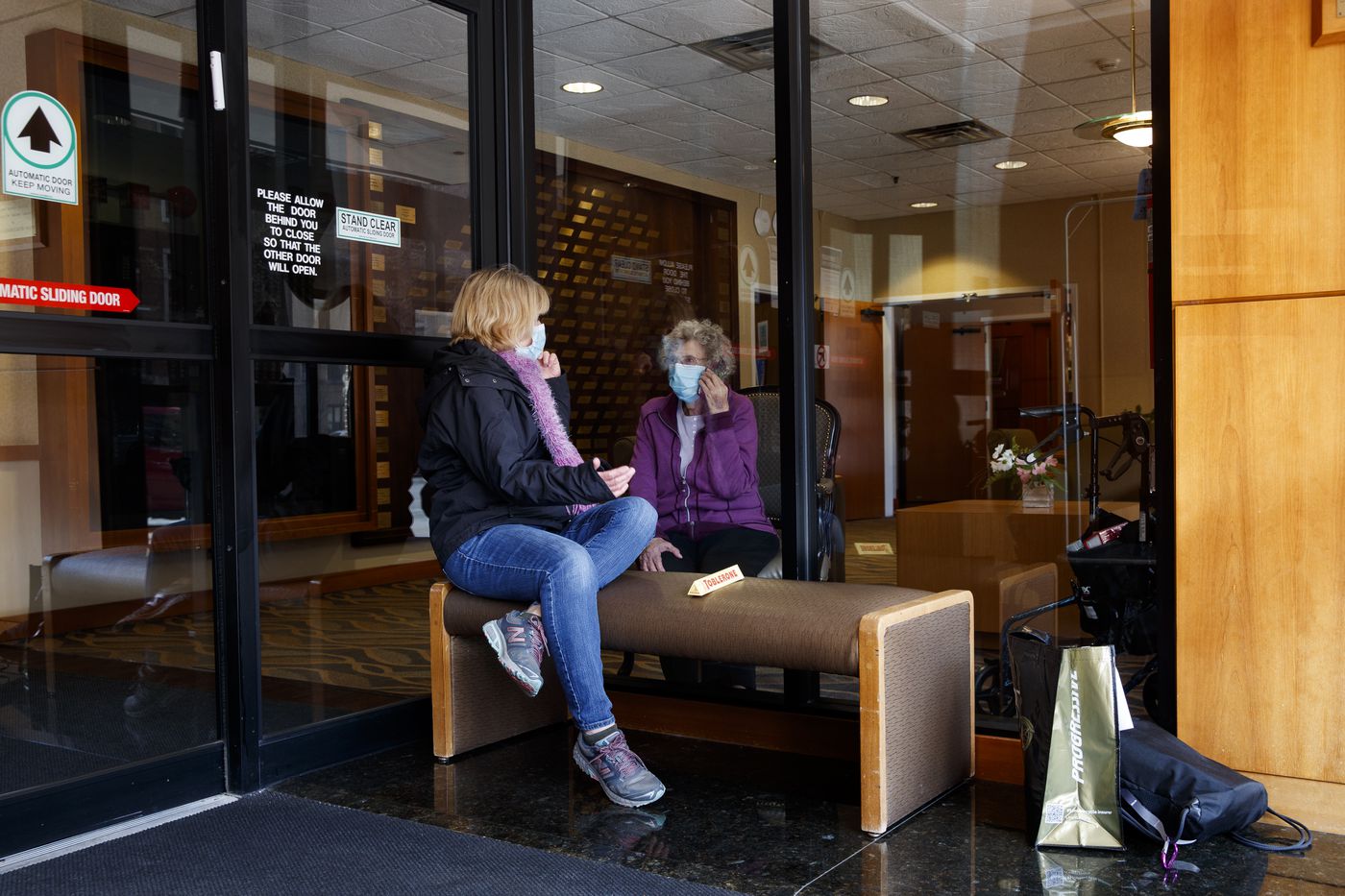This story was written by Howard Reich, published on The Chicago Tribune.
Before the coronavirus pandemic, Suzanne Heuberger visited her parents several times a week at The Selfhelp Home on West Argyle Street.
She would join them for meals, sit with them during concerts, drop in with her friends.
“I pretty much went there like every day, if not every other day,” she said. “It was great, because they had so many activities.”
Those get-togethers abruptly stopped a few weeks ago, as isolation became essential at nursing homes and senior residences across the country. As these institutions confronted rising death tolls amid an acutely vulnerable population, social distancing became a paramount concern. Now Heuberger can visit her 89-year-old mother only from a distance — and from the other side of glass.
“This is devastating for us,” said Heuberger. “I get it, that we can’t go in. … Any time my mom wants to come down to the lobby, she’s allowed to come down to the lobby. I talk to her like we’re in prison.
“She has a cellphone. Thank God she knows how to operate the cellphone. That keeps us going. … I’m wondering, if (residents) don’t make it through, is it a COVID-19 death? I’m stressed to the max. I told my doctor I think I need a Xanax. I’m not sleeping. I’m super stressed out. I always want to cry.
“It’s just really painful.”
For Heuberger’s mother, as for elders across the country, life in an assisted living facility or nursing home (the two often are under the same roof) has meant a new degree of separation from loved ones and from the outside world.
“I’m a nervous wreck — of course, I’m fine,” said Vera Heuberger, Suzanne’s mother, expressing a duplicity of feelings
Before the quarantine, life “was tremendous,” she said. “I have a beautiful facility here. I always tell (people) I’m in a Hilton Hotel room. … Suzanne could come every day after work.
“Now we’re talking and seeing each other through the glass door in the hallway. And I have the phone, and she has the phone.”
Both Suzanne and Vera Heuberger hasten to add that The Selfhelp Home, like many other institutions, has been working assiduously to try to combat the added isolation and loneliness that shut-in seniors may feel at this time. Though residents mostly are confined to their individual rooms, strategies — including those vestibule visits — have been designed to try to keep them connected to each other and to their relatives and friends.
“I can’t hug her, I can’t kiss her, OK,” said Vera Heuberger. “But I can see her, and that already is incredible, and chat with her as long as we want to. Half an hour, an hour. As long as we want to gossip.”
Meeting through a window is just one of many methods these institutions quickly have developed in the face of the pandemic.
“One of the most challenging things to prepare for during this period is that loss of connection the residents are feeling,” said Efrat Dallal, chief marketing officer at The Selfhelp Home.
“Mealtime in the dining room is one of the most social points of the day. As soon as community contact came to an end, all our activities and concerts had to be canceled. We quickly had to shift gears and find ways to keep the residents connected.”
They did so by establishing an in-house TV channel that delivers announcements, displays residents’ photos, screens films and offers other diversions.
“We immediately launched an iPad drive, reaching out to our families and our volunteer community,” said Dallal. “Now we have enough iPads to make sure our residents can FaceTime and Zoom with family members.
“Our population is 80s and 90s and higher — the introduction of technology was not so easy. But through all this we’ve taught many of them how to use it, and it’s been very rewarding. The iPads have also helped them stay connected to each other.
“We set up ladies that (used to) dine together, and they missed dining together. So we set them all up with their own iPads during dinner time, and we set up a Zoom with them. They chatted for over an hour,” each from her own room.
At Montgomery Place, on South Shore Drive, executives and other staff decided to move into the facility starting March 13.
“We were here 24/7 for the first two weeks,” said Stefanie Dziedzic, chief relationship officer. “When things mellowed out a bit, we were able to go into a rotation.
“The purpose of that was being really the makeshift family for our residents, so they had consistent faces, consistent messaging, so they didn’t feel more alone.
“When you wake up in the middle of the night and are scared, the people you know are here.”
Montgomery Place and other institutions decided early on that if the residents couldn’t come to the activities, the activities would come to the residents.
“We instituted Happy Hour,” said Dziedzic. “Now that the residents have been in isolation for 14 days, the risk is pretty low. We’re bringing in a bar cart to the floors, and we’re setting up a makeshift bar in the lobby, so people can get out and socialize a little more,” at a safe distance.
“We’re delivering meals to every floor three times a day, so they get to see a lot of the staff members and interact with (them).”
Even so, this ongoing and indefinite period of isolation inevitably “seems long,” said Ida Watanabe, 81, who has lived at Montgomery Place with her husband for more than two years.
“But I’ve just tried to maintain an attitude of one day at a time and figuring out: Well, we’ll get to another day, and what’s that going to take?
“I spent 30 years as a social worker, so I’ve tried to rely on that training. I try to remember, to understand how it can — if you let it — play tricks on you. And not allow us to get depressed.
“I know you have to find ways to keep going and reach out. That’s important: to reach out.”
Among those Watanabe stays in touch with is her son, who lives in the neighborhood.
“Of course, it’s difficult not being able to spend time with them in person,” said Scott Watanabe, who used to dine with his parents every week at Montgomery Place.
“I have a lot of peace of mind knowing that they live in a building with on-staff nurses.”
For 95-year-old retired schoolteacher and principal Paul Bruce, who lives at Montgomery Place, “It was a little depressing at first not to see anybody,” he said.
“But (when) the weather seems warmer, we have a garden here, we can go down and walk in the garden.
“They bring wine and cheese up to you and give it to you at your door.”
Though Bruce has “outlived everyone in my family by about 30 years,” he said, he fills his days talking to friends on the phone and reading. As for the psychological stress of this period, “I personally have not heard of any significant cases of depression, but we’re very straight about it,” said Dziedzic, the Montgomery Place chief relationship officer.
“We talk about it and give tips about what people can do to avoid falling into the doldrums. We share tidbits. We call it out.
“We say: It’s frustrating. It’s really frustrating. We get it. So here are things you might want to think about and share tips along the way to keep them positive. We also did an internal positivity campaign with fun things: Be like a proton and stay positive. They seem to be responding well to it. They’re all very gracious.
“Initially, there were some people who didn’t take this seriously and felt we were overreacting and were pretty resentful about some of the restrictions that had gone into place. But even the people who have been dragging their heels have come around.”
At some institutions, residential hallways have become the new activity centers.
St. Joseph Village on West Belmont Avenue, a ministry of the Franciscan Sisters of Chicago, recently celebrated Palm Sunday by having “people draw palms to put on their doors,” said Dawn Mayer, vice president of mission integration and pastoral care.
“When they open their doors and look out, they (would) see a procession of palms down the hallway on the doors. We (had) people decorate their doors for Easter, so people can open their doors and see life and beauty are still around them.”
At The Admiral on the Lake, on West Foster Avenue, “We’ve had our staff walk through hallways — with full-on protective gear — play music, sing to those in doorways,” said executive director Nadia Geigler.
Some residents have “decided to meet in the thresholds of their doorways, at a safe distance, for happy hours. Everybody brings their glass of wine and chats for a little bit.
“We’re also wanting to make sure we’re paying attention to folks who are struggling. Maybe they don’t have access to technology. They might feel a lot more cut off. Our staff is paying individual visits to those folks, checking in on them to make sure they’re not feeling too lonely.
“There are (residents) who have raised their hands to say, ‘I’m feeling a little lonely.’ Others have said, ‘I’m happy to call somebody.’
“They’re paired up.”
To further boost spirits, Admiral residents council president Toni Smith sends “funny emails two or three times a day to all the residents who have computers,” she said.
These include tweets and other postings, such as:
“Gas is finally affordable, and we can’t go anywhere!”
“Critical advisory: 8 p.m. is now the official time to remove your day pajamas and to put your night pajamas on.”
The Admiral has continued its long-running program of bringing in guest speakers. Each arrives at the front desk, has his or her temperature checked, then steps outside to enter the auditorium from an exterior door. The speaker sits in an empty auditorium with a lone camera operator (who broadcasts the talk via the in-house TV channel) and Smith, who fields post-lecture questions from residents via text and email.
Mask-making projects at the Admiral, Montgomery Place and other venues also keep residents busy and contributing.
And though Suzanne Heuberger and her parents miss having Sabbath dinner together at The Selfhelp Home, which was designed to “accommodate the needs of older Jewish adults,” the sacred Friday evening tradition continues.
“Shabbat has always been very special here — residents dress up,” said Dallal, the Selfhelp executive.
“Since the first week of our quarantine, we promised to keep the tradition of lighting candles, saying Kiddush (a Hebraic prayer). Our hashtag is: Shabbat is never canceled.
“We created a Shabbat car, with challah and wine and candles, and we have music playing.
“They stay at their doorways,” added Dallal, referring to residents who find Shabbat coming to them.
“The first week, we caught some of them by surprise. The second week, we noticed that they were ready and dressed. OK!
“We’re trying to create a new sense of something familiar and normal. Our staff has been really heroes through all this. We’ve made T-shirts that say ‘heroes,’ signs all over the building that say we’re all heroes.
“I’m on the verge of crying all day.”
But out of hope and joy as well as sadness.


